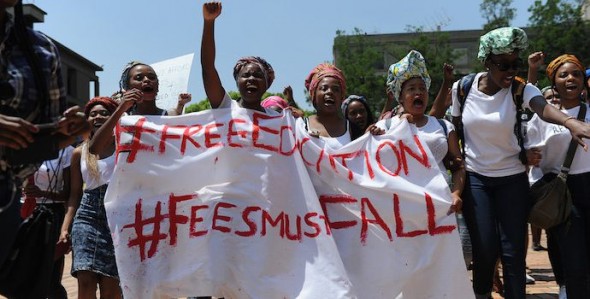Anna Venguer
Potential stark increases in higher education fees in South Africa have incited a wave of violent student protests that have swept across university campuses (ENCA, 20 Sept. 2016). These proposed tuition fee increases, estimated to be between ten and twelve percent, sparked a series of protests on a national scale last October that have culminated in a powerful year-long movement known as ‘Fees Must Fall’ (BBC News, 23 Oct. 2015). Driven by the notions that these fee hikes do not only disproportionately impact the poor, but also have a racial dimension to them, university students have shed light on South Africa’s continuing struggle to rectify their historical legacy of racial segregation and pervasive inequality (The Washington Post, 23 Sept. 2016).
The protests abated when President Jacob Zuma decided, in response to the student uproar, that there would be no fee increases in 2016 (The Washington Post, 23 Sept. 2016). Nevertheless, the violent protests erupted once again last Monday after the Minister of Higher Education and Training granted universities the discretionary power to decide for themselves whether or not to raise fees in 2017. Since Monday, police personnel have been deployed on various university campuses across the country including the University of Wits, University of Cape Town, and the University of Pretoria to mitigate the intensity of the protests (ENCA, 20 Sept. 2016). Although the majority of the demonstrations have been peaceful, there have been some instances of severe violence both from the activist students and from the police. A local newspaper outlined how students were caught throwing rocks at security guards while the police has been accused of firing stun grenades and rubber bullets at protesting students. Further, in the wake of the spiraling protests, there have been widespread arrests for noncomplying students and many universities have resorted to suspending their lectures until the violence subdues (ENCA, 20 Sept. 2016).
The Washington Post article alludes to an underlying “bigger struggle” that university students are fervently fighting to overcome, namely racial segregation (The Washington Post, 23 Sept. 2016). South Africa has a turbulent history with racial discrimination that stems from colonialist ambitions to subordinate the native Black population. Despite the collapse of the Apartheid regime in 1994, traces of racial prejudice continue to be present as the Black population remains underrepresented both at the student body and faculty level (ENCA, 20 Sept. 2016). The author of this article underlines that the Fees Must Fall movement seeks to “redress systemic inequalities” (The Washington Post, 23 Sept. 2016). This conflict theorist argument suggests that the colonial attitude persists and the privileged race is attempting to use education as tool to preserve its economic and political power by impeding lower-income students, who tend to be primarily Black, from obtaining tertiary educations. Although the article portrays the struggle through a racial lens, a more Marxist view would argue that this increase in fees is geared primarily towards reducing the opportunities for the lower-income students, irrespective of their race.
Yet, regardless of which perspective we adopt, it is evident that education is a powerful instrument in shaping and defining the political, economic, and social opportunities of individuals. As the South African youth push the government to tackle the question of the accessibility of higher education they will be forced to consider the implications of this controversial change. Will this increase lead to a disillusionment with the government and an escalation of violent revolts? How will South Africa remedy the widening income and racial inequalities? Will protests continue to disrupt lectures until the government reaches an acceptable consensus? How long will this take? After a year, the Fees Must Fall movement has gained momentum and mobilized students across the country to voice their dissatisfaction with the university and government education policies (Don’t Party, 26 Sept. 2016). The interplay between violence and education in this scenario, reinforces the deep-rooted frustrations in the opportunities afforded to South Africans of different economic classes and races.
References:
“Is #FeesMustFall the Most Significant Protest of the New South Africa?” Don’t Party, 26 Sept. 2016. http://www.dontparty.co.za/latest-news/is-feesmustfall-the-most-significant-protest-of-the-new-south-africa/. Accessed 26 Sept. 2016.
Mahr, Krista. “South Africa’s Student Protests are Part of a Much Bigger Struggle.” The Washington Post, 23 Sept. 2016. https://www.washingtonpost.com/news/worldviews/wp/2016/09/23/south-africas-student-protests-are-part-of-a-much-bigger-struggle/. Accessed 24 Sept. 2016.
“Update: Wits Protests Spread, Police Fire Stun Grenades.” ENCA, 20 Sept. 2016. https://www.enca.com/south-africa/ten-arrested-at-wits. Accessed 24 Sept. 2016.
“Why are South African Students Protesting?” BBC News, 23 Oct. 2015. http://www.bbc.com/news/world-africa-34615004. Accessed 24 Sept. 2016.
